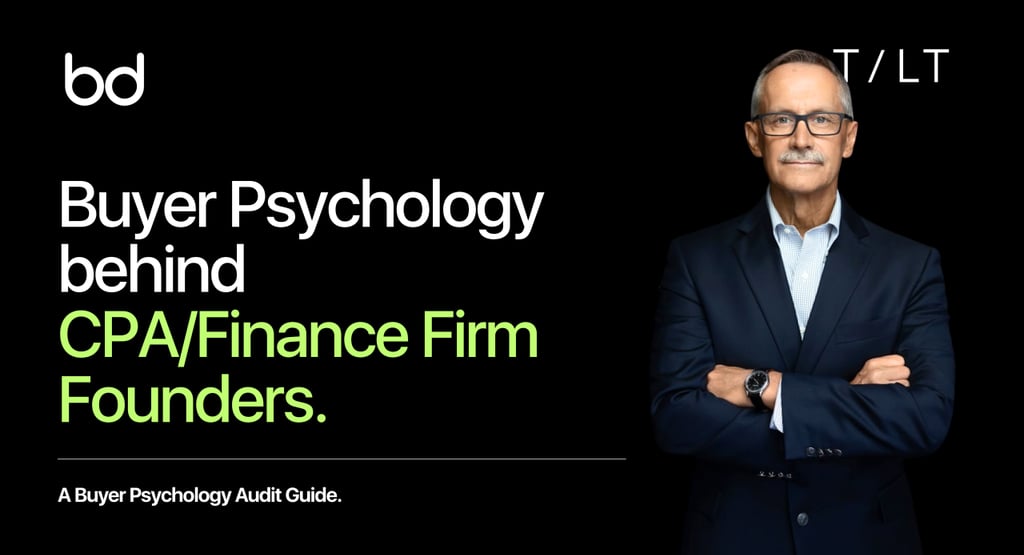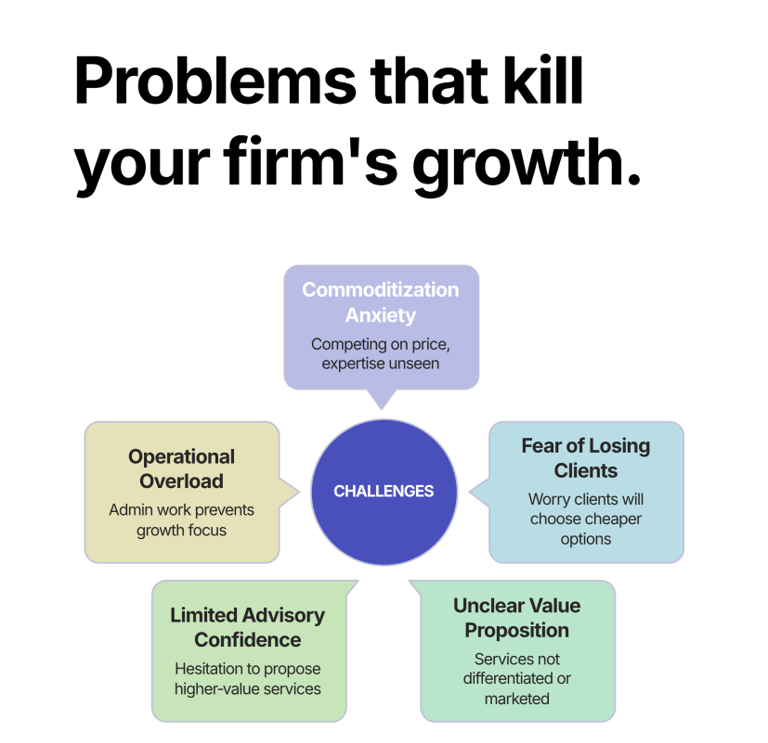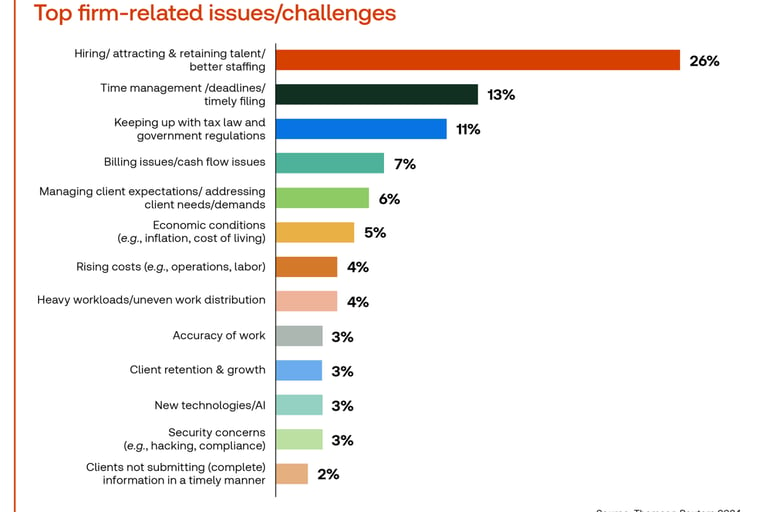Behind CPA/Finance Firm Founders - A Buyer Psychology Audit Guide
Every CPA / Finance / Tax firm founder craves it. Either loudly or silently, both "the autonomy of ownership" and the "validation of peer success." Understanding this psychological duality, competent professionals struggling with business-owner challenges is essential for effective messaging, solution design, and relationship building with this audienceuilding with this audience.
Brand Blinks Global
11 min read


Every CPA / Finance / Tax firm founder craves it. Either loudly or silently, both "the autonomy of ownership" and the "validation of peer success."
Firms' profile reveals founders who are simultaneously confident in their technical expertise yet deeply insecure about business operations, pricing strategy, and market positioning.
Understanding this psychological duality, competent professionals struggling with business-owner challenges is essential for effective messaging, solution design, and relationship building with this audienceuilding with this audience.
Core Desires and Fears
Primary Desire
Professional Recognition and Credibility: These founders are driven by a deep desire to be viewed as trusted advisors rather than transactional service providers. They entered the profession to make meaningful impacts on their clients' financial health, not simply to file forms and process returns. The shift from "compliance commodity" to "strategic partner" status represents their ultimate professional aspiration.
Financial Stability with Independence: Small firm owners value the autonomy of business ownership but are simultaneously burdened by its financial unpredictability. They're motivated by building sustainable, profitable practices that don't require 60-80 hour workweeks during busy season. The goal is predictable revenue that supports their lifestyle without sacrificing their well-being or family time.
Client Success and Long-term Relationships: Despite frustrations with client ghosting and non-payment, these professionals are genuinely motivated by helping clients succeed. They measure their worth through client retention, referrals, and the tangible business outcomes they help create, not just billable hours.
Legacy and Firm Value: Many are building something they can eventually sell or pass on. The motivation extends beyond immediate income to creating a valuable asset that represents years of relationship-building and expertise.
Unspoken Fears
Commoditization and Price Competition: The fear that clients view their services as interchangeable haunts small firm owners. With DIY software like TurboTax and offshore accounting services creating downward pricing pressure, they fear becoming the "budget option" competing solely on price rather than value.
Financial Instability and Cash Flow Disruption: Irregular payment cycles, client ghosting, and seasonal revenue create persistent anxiety. Nearly 46% of financial professionals experience payment difficulties, making cash flow management a constant source of stress. The fear of not making payroll or covering fixed expenses during slow periods is very real.
Failure and Business Collapse: Like many small business owners, CPA firm founders face the stark reality that 50% of businesses fail within five years. This fear is compounded by the personal financial risk many have assumed, business loans, office leases, and the opportunity cost of not working in a stable corporate environment.
Loss of Control and Overwhelm: The fear of being buried in client work with no time for strategy, marketing, or growth. They worry about becoming reactive rather than proactive, constantly firefighting instead of building the advisory practice they envisioned. Decision fatigue and burnout are constant threats.
Reputation Damage: In tight-knit business communities, word travels fast. These founders fear that one unhappy client, one missed deadline, or one compliance error could destroy years of reputation-building. The stakes feel impossibly high because their personal credibility is their primary asset.
Technological Disruption: Fear that AI, automation, and fintech will render traditional accounting services obsolete. They worry about investing in the "wrong" technology or being left behind by competitors who adopt faster.
Client Attrition Without Understanding Why: The ghosting phenomenon creates deep anxiety because it leaves no opportunity for improvement or closure. When clients disappear without explanation, especially after significant proposal work, it triggers self-doubt about pricing, positioning, and service quality.
Decision-Making Triggers
Primary Triggers
Crisis Moments and Deadlines: Tax season (January-April) and year-end reporting create the most acute decision pressure. These founders make purchasing decisions when they're overwhelmed, needing software, outsourcing, or automation to survive the crunch. They're most receptive to solutions during or immediately after peak periods when pain is highest.
Revenue Threshold Crossings: When hitting specific revenue milestones ($250K, $500K, $1M), founders recognize they need to "level up" their operations. These moments trigger decisions about hiring, upgrading technology, or investing in advisory services training.
Staff Turnover or Hiring Needs: Losing a key team member or recognizing capacity constraints triggers decisions about practice management software, outsourcing, or restructuring. The realization that they can't personally serve every client forces strategic choices.
Repeated Client Complaints or Ghosting Patterns: When multiple clients express similar concerns, slow response times, unclear communication, and confusing deliverables, founders recognize systemic problems requiring solutions. The pattern creates urgency that isolated incidents don't tax.
Referral Partner Feedback: Input from attorneys, financial advisors, and other professional referral sources carries enormous weight. When a trusted peer suggests they're underpricing, overworked, or offering unclear value propositions, these founders listen.
Financial Audit or Personal Cash Flow Crisis: When their own bookkeeper shows concerning numbers or personal finances become strained, reality sets in. These moments trigger decisions about pricing increases, service restructuring, or dropping unprofitable clients.
Competitor Success Stories: Seeing peers implement successful advisory services, raise prices without client loss, or achieve better work-life balance creates "FOMO" that triggers action.
Decision-Making Psychology
Risk-Averse but Desperate: These founders are naturally conservative (they're accountants, after all), but desperation during busy season or cash flow crises can override typical caution. They'll make faster decisions when pain exceeds fear.
Peer Validation Required: Decisions feel safer when other small firm owners have successfully implemented similar changes. Testimonials from firms of similar size carry more weight than thought leader opinions.
ROI-Obsessed: Every investment must demonstrate clear financial return. Vague promises of "better client experience" don't resonate; specific metrics like "reduce time per return by 40%" or "increase average fee by $500" trigger action.
Implementation Anxiety: Fear of disruption during the busy season delays decisions. Solutions that promise "no implementation during tax season" or "start during summer months" reduce friction.
Language Patterns and Communication Style
How They Speak
Direct and Results-Oriented: Small firm founders value brevity and clarity. They appreciate bullet points, specific examples, and clear action steps over lengthy explanations. Phrases like "Here's what changed for us" and "Here's the exact ROI" resonate strongly.
Problem-First Language: They lead conversations by identifying pain points before discussing solutions. Typical phrases include:
"We're drowning in compliance work with no time for advisory."
"Clients keep ghosting after proposals."
"We're underpricing but afraid to raise rates"
"Staff can't keep up during tax season."
"We're working 70-hour weeks but not proportionally profitable"
Conservative and Risk-Aware: Language reflects cautious optimism rather than an aggressive growth mindset. They use phrases like "sustainable growth," "manageable expansion," and "controlled scaling" rather than "10X your firm" or "explosive growth."
Jargon-Heavy Within Peer Groups: Among other CPAs, they comfortably use industry terminology, realization rates, write-downs, scope creep, busy season, and billable hours. But they're acutely aware they must simplify language for clients.
Value-Defensive: When discussing pricing, they frame conversations around value delivered rather than time spent. Common phrases include "strategic guidance," "proactive planning," "year-round support," and "trusted advisor relationship."
Community-Oriented: They reference state CPA societies, professional associations, and peer groups frequently. Phrases like "other firms in our chapter" and "what peers are doing" signal the importance of professional community.
Communication Preferences
Email for Initial Contact: Preferred for prospecting and information gathering, but they expect quick responses. Long, dense emails get ignored; concise, scannable messages with clear CTAs work best.
Phone for Relationship Building: Once trust is established, they prefer phone conversations for complex discussions. They want to hear the tone and ask clarifying questions in real-time.
LinkedIn for Professional Networking: Active in accounting-focused LinkedIn groups, state society forums, and professional communities. They research potential solutions and partners through these channels before direct contact.
In-Person for High-Stakes Decisions: Major investments, partnership discussions, and strategic planning warrant face-to-face meetings or video calls. Building trust requires seeing facial expressions and body language.
Common Objections
Pricing Objections
"That's more expensive than I expected": Often reflects unrealistic expectations rather than true budget constraints. They may be comparing your solution to an incomparable alternative or haven't fully calculated their current cost of doing nothing.
"We need to think about it": Code for "I'm not convinced of the value" or "I need to talk to my partner/spouse". Rarely about actual deliberation; usually about missing confidence in ROI.
"Can you discount that?": Testing negotiation boundaries more than genuine budget limitation. Responding with scope adjustments rather than discounts preserves value perception.
"We can't afford that right now": May indicate genuine cash flow issues or prioritization problems. The question becomes whether they can afford NOT to solve the problem.
Value and Differentiation Objections
"How is this different from [competitor/cheaper option]?": Reflects confusion about positioning and unique value. They need specific, concrete differentiation, not vague promises of "better service.
"We're happy with our current setup": Often untrue, but signals a lack of urgency. The pain hasn't reached threshold levels to warrant change disruption.
"We can figure this out ourselves": DIY mentality common among small firm owners who bootstrapped their businesses. They underestimate the complexity and implementation time required.
Timing and Implementation Objections
"This isn't a good time" (especially during tax season): Legitimate concern about disruption during critical periods. Solutions must address implementation timing explicitly.
"We're too busy right now": Ironic objection since being too busy is often the problem requiring a solution. Reflects the inability to see how the current system perpetuates the busyness.
"We need to finish [other project] first": Prioritization challenge indicating unclear pain severity. Multiple competing initiatives create decision paralysis.
Risk and Trust Objections
"What if it doesn't work for us?": Risk aversion requiring proof, guarantees, or trial periods. They need clear exit ramps and risk mitigation.
"We've been burned before": Past negative experiences with solutions, consultants, or software create skepticism. Overcoming requires extensive social proof and transparent communication.
"How do I know you understand firms like ours?": Need for industry-specific expertise and peer validation. Generalist positioning doesn't resonate; niche expertise does.
Information Gathering and Community Sources
Professional Associations and Networks
State CPA Societies: Primary source for local networking, continuing education, and peer connections. Monthly meetings provide face-to-face relationship building essential for referrals and information exchange.
National Society of Accountants (NSA): Over 75 years of supporting tax and accounting professionals, offering practice management resources, member benefits, and professional development. Appeals to established small practices.
American Institute of CPAs (AICPA): Authoritative source for technical guidance, continuing education, and industry standards. While more corporate-focused, their resources on firm economics and pricing are highly valued.
National Association of Tax Professionals (NATP) and National Association of Enrolled Agents (NAEA): Specialized associations for tax practitioners offering local chapters and a professional community.
Professional Association of Small Business Accountants (PASBA): Specifically designed for CPAs and enrolled agents working with small businesses. Offers peer advisory groups and vendor discounts.
Online Communities and Forums
r/taxpros (Reddit): Active subreddit with a strong community of firm partners and owners. Known for candid discussions about firm challenges, pricing strategies, and practice management. More authentic and less filtered than formal associations.
Tax Pros Discord: Online community accessible at taxprosdiscord.com offering real-time peer support. Popular among younger firm owners comfortable with digital-first networking.
TaxTwitter (w X): Informal but engaged community of tax professionals sharing insights, challenges, and resources. Real-time industry conversation and trend identification.
LinkedIn Groups: CPA practice management groups and firm owner communities provide moderated, professional networking. Less spam than Facebook groups with more serious, business-focused discussions.
State CPA Society Private Forums: Members-only online spaces for asking sensitive questions about pricing, client issues, and firm management.
AccountingWEB and TaxProTalk.com: Established online forums for technical questions and practice management discussions. Long-standing communities with searchable archives.
Paid Communities and Coaching Groups
Thriveal (Jason Blumer): Well-known paid community focused on transforming compliance-focused firms into advisory practices. Appeals to growth-oriented firm owners seeking to differentiate.
Realize (Jason Staats): Paid community offering structured support for firm transformation and advisory service development. Known for practical implementation guidance.
Small firm-focused Facebook and LinkedIn groups: Private communities of 2,000+ members for solo CPAs and small firm partners. Free to join, but requires membership approval.
Research and Decision-Making Resources
Software Vendor Websites and Communities: QuickBooks ProAdvisor community, Intuit Accountants Community, and similar platforms where they research tools while networking.
Peer Referrals and Word-of-Mouth: The most trusted source, recommendations from firms they know and respect. Nearly 89% of CPA firms cite referrals as the top source of new business, highlighting how much they value peer opinions.
Industry Publications: Journal of Accountancy (AICPA), CPA Practice Advisor, and Accounting Today for industry trends and thought leadership.
Conferences and Trade Shows: In-person events where they evaluate new solutions, attend educational sessions, and network intensively. Approximately 65% of businesses view in-person networking at trade shows as invaluable for marketing.
Local Networking Groups: BNI (Business Network International) chapters, Chambers of Commerce, and local business associations for client acquisition and peer learning.
Information-Seeking Behavior
Research-Heavy Before Contact: They thoroughly investigate solutions online before reaching out, reading reviews, comparing features, and checking pricing. First contact often comes after significant independent research.
Peer Validation Critical: Before making significant investments, they ask other firm owners about their experiences. Testimonials from recognizable firm names carry enormous weight.
"Show Me the Numbers" Mentality: They want case studies with specific metrics, percentage improvements, dollar savings, and time reductions. Vague success stories don't resonate.
Implementation Anxiety: Actively seek information about the onboarding process, training requirements, and disruption timeline. Need reassurance that implementation won't derail operations.
Ongoing Community Participation: They don't just research and disappear; they remain active in communities for ongoing learning and support. The relationship with information sources is continuous, not transactional.
Invest in your firm’s brand.
When you’re consistently hearing that your fees are “too expensive,” it’s time to do a thorough review of your brand, including your online presence and marketing campaigns. It’s also a good idea to reflect on your team’s pitch during sales meetings.
Ask these questions when you review:
What really makes you different from your competitors? Is it obvious?
What are your key selling points, and why would they matter to a client?
Do your firm’s branding elements and communications all match up with your price range and target audience?
When you make claims about your services, do you have supporting evidence to back them up? (i.e., testimonials and concrete numbers)
Are your services truly aligning with the needs of your prospects?
Brand expert Stephen King once said, “A product can be copied by a competitor; a brand is unique. A product can be quickly outdated; a successful brand is timeless.” Whether you realize it or not, your firm has a brand. The right one can do some of the talking for you and create more confidence in your services.
Ready to make emotional branding work for your business? Connect with BBG’s expert team to design strategies that feel right and last long.















© 2026 BRNDxMORPH Media WWD Private Limited. All rights reserved.
Brand Blinks Global® | BBG is an independent global brand consulting and transformation company.
The trademarks, logos, and service marks displayed on this site are the property of their respective owners.
"Brand Blinks Global® | BBG," "Brand Blinks®," "Made for the Uncommon®," and the "bd®" logo are trademarks or registered trademarks of BRNDXMORPH Media WWD Private Limited.


